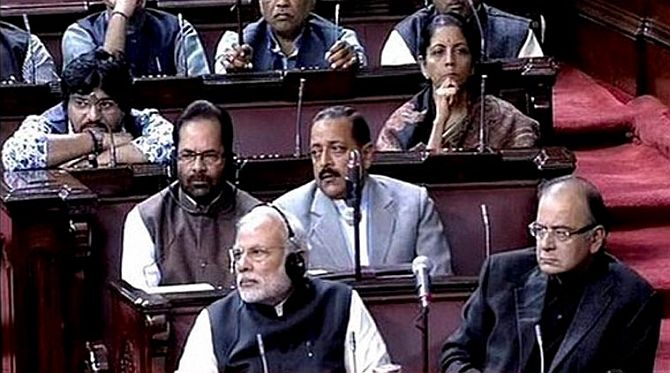Its electoral triumphs in assembly polls, particularly in Uttar Pradesh, have made the BJP the single-largest party in the Rajya Sabha, reports Archis Mohan.

The Bharatiya Janata Party is yet to announce its candidate for the vice-presidential poll, but knows its increased numbers in the Rajya Sabha, by April 2018, would mean the successor to M Hamid Ansari would have to face a less obstructionist House of Elders.
While the attention is mostly on whether or not Communist Party of India-Marxist chief Sitaram Yechury would return for a third term and, if at all, the Samajwadi Party and the Congress would come together to help Bahujan Samaj Party chief Mayawati get re-elected to the Rajya Sabha, the BJP is busy counting its improved numbers by what will be the Narendra Modi government’s last budget session.
According to a party strategist, who is also a Rajya Sabha member, the party would ideally opt for a vice-presidential candidate well-versed with the Rajya Sabha proceedings.
The vice-president of India is also the Rajya Sabha chairperson and responsible for running the House.
BJP strategists expect its vice-presidential candidate to win by a huge margin and get 550 votes, or over 70 per cent of the 788 vice-presidential electoral college votes.
The vice-presidential electoral college comprises 543 Lok Sabha and 245 Rajya Sabha members.
Over and above the nearly 400 BJP-led National Democratic Alliance votes, strategists expect regional parties such as the Biju Janata Dal, the YSR Congress, the All India Anna Dravida Munnetra Kazhagam, the Telangana Rashtra Samiti, all six independents and most of the eight nominated members, to support its vice-presidential candidate.
The NDA is currently way short of the halfway mark of 123 in the 245-member Upper House. As a result, for the better part of its tenure, the Modi government has found its legislative agenda hobbled in the Rajya Sabha and has pushed several of the bills, including Aadhaar, as ‘money bills’.
But that is set to change. The NDA, on its own, would not get a majority during the current term of the Modi government.
But the BJP, because of its electoral triumphs in assembly polls, particularly in Uttar Pradesh, is set to increase its tally by nearly a dozen seats from the current 56 by April 2018. That will make it the single-largest party in the Rajya Sabha.
Crucially, key opposition parties, especially the Congress (58) and the SP (18), are set to witness a significant decrease in their numbers. The Congress’s could come down by around 10 seats, while the SP’s could decrease by five seats.
In the changed scenario, the BJP could hope for support, on key bills as well as day-to-day functioning of the House, from ‘neutral’ regional players such as the BJD, the AIADMK and others.
From August 2017 to April 2018, as many as 70 members would retire, including three nominated members. Nine members are set to retire in August, three in January and 58 in April.
The Aam Aadmi Party is set to debut in the Rajya Sabha with three Congress members from Delhi retiring in January.










